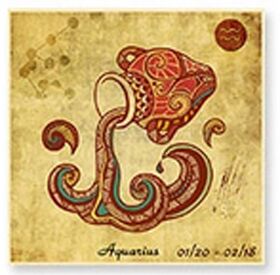Aquarius

Symbol: 
Ruling Planet: modern Uranus, traditionally Saturn
Sun in Aquarius: from around the 20th January to the 19th February
Time of Year:mid-winter[2] cold, snow and ice, but with longer days, tree sap begins to rise
Cultural: Candlemass, shrovetide
Physical body: lower leg, ankles
Star constellation: Aquarius
Mythology of the star constellation
The constellation shows a man pouring water from a jug. The Greek astrological poet Manilius, writing in the first century AD (Astronomica 5:487) described Aquarius as Ganymede, a beautiful boy whom even Jupiter found attractive. In the form of an eagle (memorialized by the nearby constellation of Aquila) Jupiter abducted Ganymede to Mount Olympus and appointed him cup bearer to the gods. This myth belies the significance of Aquarius to the Babylonians, who named the constellation Gula, The Great One, and associated his water vases with the rains that caused the annual flooding of the Tigris and Euphrates rivers and the irrigation of agricultural fields. Similarly, Aquarius may also have been associated with the ancient Egyptian Nile River god Hapi. Early Christians saw Aquarius as John the Baptist. Throughout early western astrology, the association of this constellation with a water vase or urn is unsurprising, as the Aquarid meteor shower could appear to an imaginative viewer as a man pouring water from a vase. Although the month of Aquarius is a period of extreme cold in northern climates, in the Mediterranean and Near East regions where astrology first evolved, winter is the rainy season. The sun in the sign of Aquarius as a time of winter rain further suggests that the water in the vase of the Water-Carrier portends the late winter rain.
Liz Greene[3]: In Egyptian myth, the benign god Hapi carried on his shoulders a vast jug from which he poured out the waters of the Nile, thus initiating the great annual inundation on which the crops depended. The Greeks envisaged him as the beautiful Ganymede, beloved of Zeus and cupbearer of the gods. But the mythic figure who best epitomizes Aquarius, last of the air signs, is a bearer of fire rather than water.
The Greeks called him Prometheus, which means "he who has foresight"; he stole Zeus' divine flame and gave it to human beings so that they could learn to live as civilized creatures. The magical substance which the water-bearer carries, whether fire, water or the elixir of life, is not easy to define. But the myth of Prometheus suggests that it is the power of inspired knowledge which Aquarius pours forth - knowledge of harnessing the forces of nature to create an efficiently functioning world, in which everyone and everything has its role and contributes to the good of the whole.
Prometheus was looked upon as the teacher of all civilizing arts. In a very early version of the myth, Prometheus actually made human beings out of clay. He invented architecture, astrology and astronomy, mathematies, geometry and the alphabet, and his gift of fire brought human beings out of their caves into the astonishing technology of the modern era.
The fire of foresight inspires Aquarius to strive toward the creation of an orderly system - social, political, cosmic - in which every human being has a value and a part to play. The deeply inquiring mind of Aquarius is focused almost exclusively on human potential, for this sign embodies the power of the human mind to transform nature and change the world.
Interpretation
Aquarius is the eleventh Sign of the Zodiac. As an air sign, its approach to life is primarily mental, even intellectual. As a fixed sign, Aquarius further represents the individual who remains fixed in his ideas, whether or not they are popular, conventional, or widely accepted. The traditional ruler Saturn can give Aquarius a morose disposition, but its association with Uranus probably accounts for the Aquarian reputation for eccentricity, a futuristic or scientific view of life, and innovative thinking.
Because of modern western astrology’s correlation of houses and signs, Aquarius has become linked to the House Eleven association with friendship; and by extension, with groups and organizations. Because it is an air sign, however, Aquarius is not particularly interested in the emotional commitment of close friendships of the “best friend” (and watery) variety. A sun-Aquarian is stereotypically the person with many acquaintances but few very close friends — by choice.
In combining the futuristic, iconoclastic nature of Uranus with the mental quality of an air sign, individuals with a strong emphasis on Aquarius in their natal chart are often interested in the greater good of society. They can picture a fairer society without the existing hierarchies, in which every person can follow their own interests as long as they don't infringe on the rights of others: personal freedom and independence are highly valued. Although they have a highly developed sense of their own individuality and uniqueness, they need like-minded individuals to help them pursue and realize their interests and ideas. Examples are sun-sign Aquarians and US presidents Abraham Lincoln and Franklin Delano Roosevelt. Without this vision of a greater good, expressed through a community of people with shared goals, Aquarius individuals will sometimes settle for merely being eccentric or off-beat.
Perhaps because several noted scientists and inventors (such as Charles Darwin and Thomas A. Edison) had Aquarius suns, Aquarius became noted as the sign for scientists and inventors. However, a scan of notable scientists and engineers indicates that many have their suns in other signs.
Planets and axes in Aquarius take on some of the typical qualities associated with this sign such as originality, love of freedom and of experimentation.
The Sun is in detriment in Aquarius. Both Aquarius and its opposite sign Leo share a social orientation, but whereas Leo longs to stand out from the crowd, if not lead it or receive its praise; Aquarius longs to stand apart from the crowd. When an Aquarian ego is threatened, the person is likely to absent himself from a stressful situation. Mental agility is a trait common to Aquarius and the other air signs Gemini and Libra: Gemini can assimilate many different ideas and has the ability to view things from another person's perspective. Libra strives to find the common denominator linking different perspectives and Aquarius has the ability to view things from a completely new and unconventional perspective. Some modern astrologers claim that Mercury is exalted in Aquarius, although Virgo is the traditional sign of Mercury’s exaltation. From the two signs that stand in square to it Aquarius can learn the value of commitment (Taurus) and profundity (Scorpio).
Due to the precession of the equinoxes, most people with planets in Aquarius in the tropical zodiac of western astrology would find that their planets had shifted backwards 23.5 degrees into Capricorn in a Sidereal zodiac, which is the kind used in Vedic (Hindu) astrology. Similarly, sun-sign Pisces might learn that they are considered to be Aquarians in a Vedic chart. Khumba, the Vedic name for this sign, is not notably different from the western descriptions of astrology, with the exception that the sign ruler remains as Saturn.
Similarly, because few horary astrologers use the modern planet Uranus, Saturn remains the Ruler of Aquarius in horary astrology.
See also
Weblinks
- Aquarius the Waterbearer (Deborah Houlding, Skyscript)
- The Zodiac Suite: "Aquarius" by Rebecca Tripp (youTube)
- Sound of zodiac - Aquarius (youTube)
- Aquarius: the Waterbearer (Houlding on the myth and constellation of Aquarius, i.e. its fixed Stars.)
